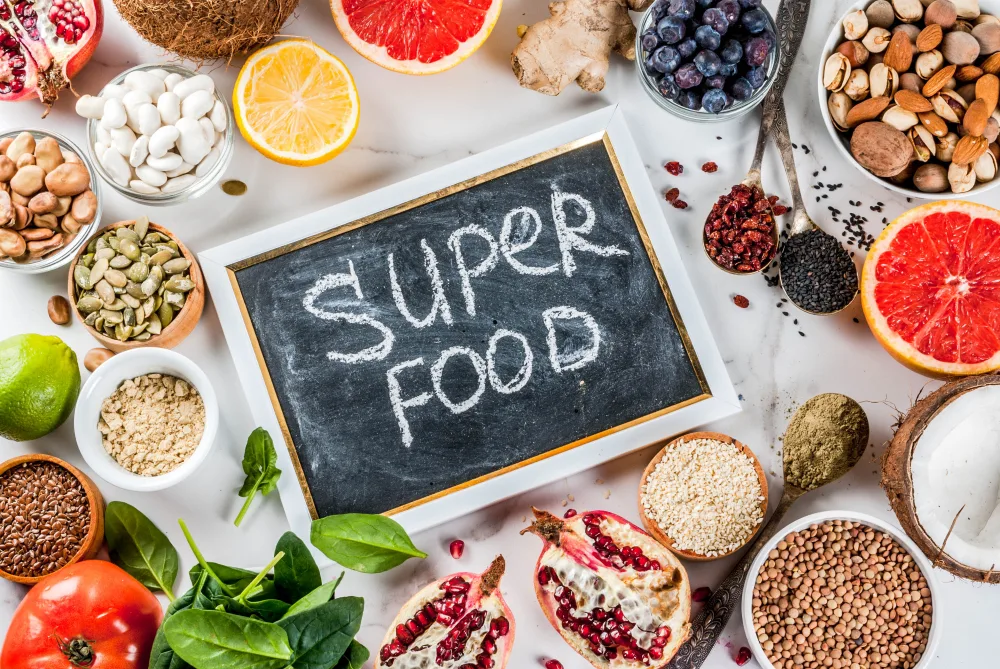Staying healthy and energized is a universal goal, and Superfoods 101 provides a starting point for choosing nutrient-dense ingredients that help bolster your immune system. While “superfoods” is a term often used to describe exceptionally nutritious items, the reality is that many everyday foods also carry powerful health benefits. This guide explores how superfoods can support your immunity, outlines practical tips for integrating them into your meals, and offers insights into combining superfoods with a balanced lifestyle for a robust defense against illness.
Understanding Immunity and the Role of Superfoods
Your immune system acts as a complex network of cells, tissues, and organs working together to fight off viruses, bacteria, and other harmful invaders. It relies on essential nutrients—from vitamins and minerals to antioxidants and phytochemicals—to function effectively. That’s where superfoods come in. Often packed with high levels of these key nutrients, superfoods can assist in keeping your immune system strong.
What Makes a Food “Super”?
While there’s no strict scientific definition for superfoods, they are commonly characterized by:
- High Nutrient Density: Concentrated amounts of vitamins, minerals, and antioxidants in relatively small servings.
- Versatile Health Benefits: Potential to help reduce inflammation, support cellular health, and enhance bodily functions, including immunity.
- Research-Backed Properties: Many superfoods—like berries, cruciferous vegetables, and certain seeds—have been studied for their disease-preventing or health-supporting properties.
For more information on how to build a nutritious diet overall, check out our post on Balancing Hormones Through Nutritious Eating Habits. Although the focus there is on hormonal equilibrium, many of the same nutrient principles apply to immune support.
Key Nutrients for a Strong Immune System
Before diving into specific superfoods, it’s valuable to understand the particular nutrients that play the most significant roles in fortifying immunity:
- Vitamin C: Known for its ability to support immune cells, vitamin C fights oxidative stress and helps shorten the duration of common colds. Found in citrus fruits, bell peppers, and strawberries.
- Vitamin D: Crucial for modulating immune responses, vitamin D can enhance your body’s defense mechanisms. While your skin synthesizes vitamin D from sunlight, it’s also present in fatty fish and fortified dairy or plant-based milk.
- Zinc: Plays a vital role in cell growth and immune-cell production. Oysters, pumpkin seeds, and legumes are prime sources of zinc.
- Antioxidants: These compounds (including polyphenols, flavonoids, and carotenoids) neutralize harmful free radicals. Foods like berries, green tea, and leafy greens supply potent antioxidants.
- Protein: Builds and repairs tissues, including those involved in immune response. Lean meats, poultry, eggs, beans, and tofu are excellent protein options.
To delve deeper into the connection between nutrient intake and body-wide health, the Harvard T.H. Chan School of Public Health offers evidence-based perspectives on the impact of balanced diets.
Top Superfoods 101: Building Your Immune-Boosting Arsenal
While a wide range of foods contribute to good health, some items stand out as especially useful in Superfoods 101—particularly when your aim is to strengthen immunity. Here are a few notable examples:
1. Berries
Berries such as blueberries, strawberries, raspberries, and blackberries are known for their high antioxidant content, which helps combat free radicals that can weaken your immune defenses. They also provide dietary fiber, supporting gut health—a key factor in overall immunity.
- How to Enjoy: Add a handful of berries to yogurt, oatmeal, or smoothies. They can also serve as a refreshing snack on their own.
2. Cruciferous Vegetables
Broccoli, kale, cauliflower, and Brussels sprouts are members of the cruciferous family. They contain vitamins C, E, and K, as well as folate and various phytonutrients that have been linked to reduced inflammation.
- Quick Tip: Lightly steam or sauté cruciferous vegetables to preserve maximum nutrient content. Overcooking can degrade some of their vitamins and antioxidants.
3. Citrus Fruits
Oranges, grapefruits, lemons, and limes are famous for their vitamin C content, a nutrient closely tied to immune cell effectiveness. They also provide a dose of fiber, hydration, and various antioxidants.
- Easy Inclusion: Squeeze fresh lemon juice over salads or mix lime juice into water for a zesty flavor. Enjoy an orange or grapefruit as a nutritious dessert alternative.
4. Garlic and Onions
These aromatic staples contain sulfur-containing compounds, such as allicin, believed to have antiviral and antibacterial properties. Garlic and onions also lend depth of flavor to many savory dishes without relying on excessive sodium.
- How to Use: Sauté onions and garlic in olive oil as the base for soups, sauces, and stir-fries. For added immune perks, try finely chopping fresh garlic and adding it to homemade dressings.
5. Nuts and Seeds
Almonds, walnuts, sunflower seeds, and chia seeds each offer unique nutrient profiles. Almonds, for instance, are high in vitamin E, a potent antioxidant, while pumpkin seeds are renowned for their zinc content. Many seeds are rich in healthy fats that help absorb fat-soluble vitamins.
- Snack Smart: Create a custom trail mix with your favorite nuts and seeds for an on-the-go source of immune-supporting nutrients.
6. Ginger and Turmeric
Ginger and turmeric hold anti-inflammatory properties attributed to compounds like gingerol and curcumin, respectively. They are recognized for soothing digestion and helping maintain a balanced immune response.
- Usage Ideas: Brew a soothing ginger-turmeric tea, or stir grated ginger into soups. Turmeric pairs well with black pepper, which enhances curcumin absorption.
7. Yogurt and Kefir
Probiotic-rich fermented dairy products, such as yogurt and kefir, nourish beneficial gut bacteria that bolster immune defenses. The healthy microbes help maintain the integrity of the intestinal lining and combat harmful pathogens.
- Flavor Tip: If plain yogurt seems too tart, sweeten it naturally with fresh fruit or a small drizzle of honey rather than refined sugars.
8. Green Tea
This popular beverage brims with catechins, a type of antioxidant. Research suggests it may enhance immune function and protect cells from oxidative damage.
- Brew It Right: Steep green tea for about 2–3 minutes in water that’s just under boiling to prevent bitterness and preserve the tea’s beneficial compounds.
Preparing Everyday Meals with Superfoods
Incorporating these superfoods doesn’t require an elaborate new meal plan. Instead, try simple swaps and recipe additions. For example:
- Breakfast: Top your oatmeal with fresh berries, chia seeds, and a spoonful of yogurt.
- Lunch: Toss spinach, kale, or broccoli florets into your salad; add sliced citrus fruits for extra vitamin C.
- Dinner: Cook a stir-fry using onions, garlic, and turmeric. Include lean protein like chicken or tofu for a balanced plate.
- Snacks: Munch on nuts or seeds instead of chips, or blend a berry smoothie with kefir or yogurt for a protein boost.
For a creative take on nutritious breakfasts, see our post on Sensational Smoothie Bowls. These bowls make it easy to combine multiple superfoods—like berries, spinach, seeds, and yogurt—into a single, flavorful dish.
Lifestyle Factors That Enhance Immunity
Even the most super of superfoods can’t fully protect your immune system if other lifestyle factors work against it. Complement your diet with these supportive habits:
- Adequate Sleep: Hormone regulation, tissue repair, and immune cell production all happen during sleep. Aim for 7–9 hours each night.
- Regular Exercise: Moderate physical activity, such as brisk walking or cycling, boosts immune function by improving circulation and reducing stress hormones.
- Stress Management: Chronic stress elevates cortisol levels, which can suppress your immune response over time. Techniques like mindfulness, yoga, or journaling can mitigate stress’s impact.
- Hydration: Water is crucial for carrying nutrients to cells and flushing out toxins. Staying well-hydrated supports immune efficiency.
- Limit Alcohol and Tobacco: Both alcohol misuse and smoking compromise immune cells, making you more susceptible to infections.
For a deeper dive into how diet and lifestyle habits work synergistically, check out Balancing Hormones Through Nutritious Eating Habits. While it focuses on hormonal health, many of the same principles apply to overall immune resilience.
Common Myths About Superfoods and Immunity
- Myth 1: Eating a Single “Miracle Food” Solves Everything
No single food can deliver all the nutrients you need for immunity. A varied, balanced diet remains key. - Myth 2: More Antioxidants Mean Instant Immunity
While antioxidants are vital, consistently mega-dosing on supplements may disrupt your body’s natural balance. Whole, nutrient-rich foods are safer and more comprehensive sources. - Myth 3: Superfoods Are Always Expensive and Exotic
Many items considered superfoods—like beans, onions, and frozen berries—are widely available at budget-friendly prices.
Checking reputable sources such as the Cleveland Clinic can help you sort fact from fiction when it comes to nutrition claims.
Sample One-Day Meal Plan Featuring Superfoods
Here’s a short, practical example of how to include superfoods throughout the day:
- Breakfast: Oatmeal topped with sliced strawberries, flaxseeds, and a dollop of yogurt for probiotics.
- Mid-Morning Snack: A handful of walnuts and an apple.
- Lunch: Spinach salad with grilled chicken, orange segments, sliced almonds, and a light vinaigrette.
- Afternoon Tea: A cup of green tea with ginger for anti-inflammatory benefits.
- Dinner: Salmon fillet seasoned with garlic and herbs, served alongside roasted broccoli and brown rice or quinoa.
- Dessert or Evening Snack: Mixed berries with a drizzle of dark chocolate sauce (low sugar).
Long-Term Benefits of a Superfood-Inspired Diet
Embracing Superfoods 101 as part of your broader eating strategy can yield far-reaching advantages beyond a robust immune system:
- Enhanced Energy Levels: Nutrient-dense foods supply lasting energy, helping you avoid blood sugar crashes.
- Better Weight Management: Whole, satisfying superfoods naturally crowd out high-calorie processed items.
- Improved Digestion: Fiber in fruits, vegetables, and whole grains promotes healthy gut function, which further supports immunity.
- Heart Health: Many superfoods (e.g., walnuts, leafy greens, berries) have also been linked to improved cardiovascular markers.
- Reduced Inflammation: Foods rich in antioxidants and healthy fats can mitigate chronic inflammation, a major contributor to various health issues.
If you want more ideas for heart-friendly meals that also complement immune health, refer to our post on Eating Well for Heart Health. It underscores how dietary decisions often overlap in promoting multiple aspects of wellness.
Putting It All Together
While superfoods might sound like a trendy buzzword, a closer look reveals genuine value in focusing on nutrient-rich ingredients. By integrating berries, cruciferous vegetables, nuts, seeds, and other immunity-supporting foods into your daily meals, you equip your body with the necessary tools to fend off illness, maintain energy, and safeguard long-term health. Remember that variety and balance remain essential; a diet overly reliant on any one item—even a “superfood”—can neglect vital nutrients found in others.
Combine these dietary choices with stable lifestyle habits—like sufficient sleep, consistent exercise, and stress reduction techniques—to create an environment where your immune system thrives. If you suspect you have underlying conditions or unique nutrient needs, consulting a healthcare professional for personalized guidance is always a sound approach.
In short, Superfoods 101 is about more than just a list of trendy ingredients—it’s a method of proactively fueling your body so it can operate at its best. By regularly incorporating these immune-boosting foods into an otherwise balanced, whole-food diet, you’ll help ensure that your body’s defenses stay strong, letting you live with greater resilience, energy, and confidence.


Leave a Reply